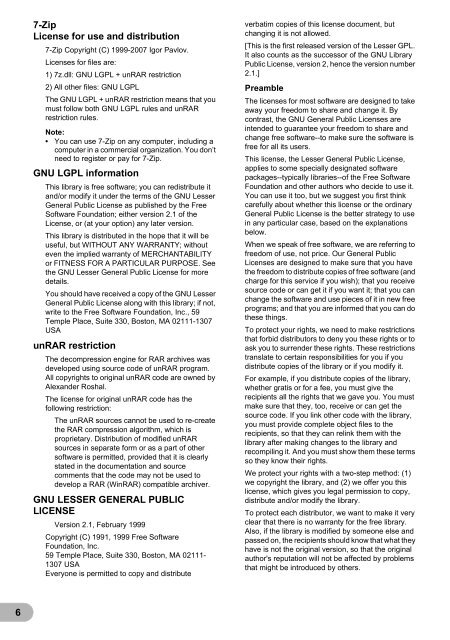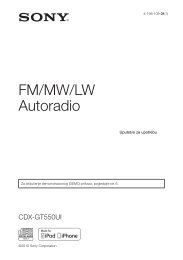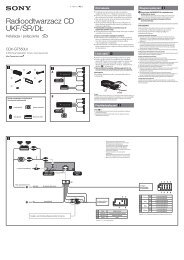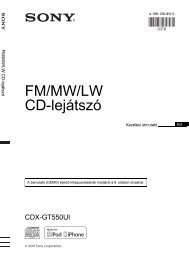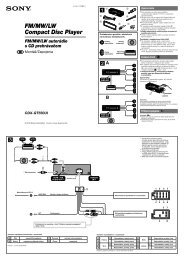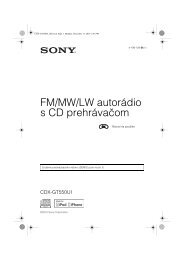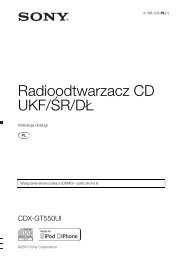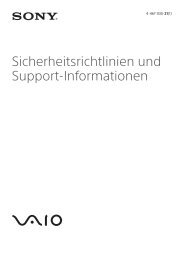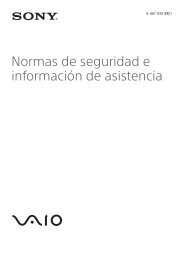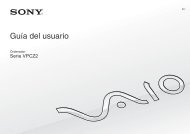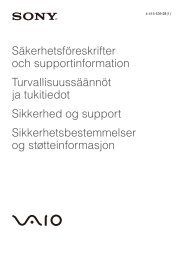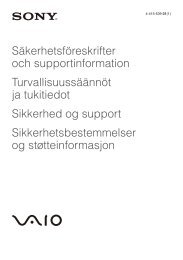Pioneer AVIC-F9210BT - Addendum - hongrois
Pioneer AVIC-F9210BT - Addendum - hongrois
Pioneer AVIC-F9210BT - Addendum - hongrois
You also want an ePaper? Increase the reach of your titles
YUMPU automatically turns print PDFs into web optimized ePapers that Google loves.
7-Zip<br />
License for use and distribution<br />
7-Zip Copyright (C) 1999-2007 Igor Pavlov.<br />
Licenses for files are:<br />
1) 7z.dll: GNU LGPL + unRAR restriction<br />
2) All other files: GNU LGPL<br />
The GNU LGPL + unRAR restriction means that you<br />
must follow both GNU LGPL rules and unRAR<br />
restriction rules.<br />
Note:<br />
• You can use 7-Zip on any computer, including a<br />
computer in a commercial organization. You don’t<br />
need to register or pay for 7-Zip.<br />
GNU LGPL information<br />
This library is free software; you can redistribute it<br />
and/or modify it under the terms of the GNU Lesser<br />
General Public License as published by the Free<br />
Software Foundation; either version 2.1 of the<br />
License, or (at your option) any later version.<br />
This library is distributed in the hope that it will be<br />
useful, but WITHOUT ANY WARRANTY; without<br />
even the implied warranty of MERCHANTABILITY<br />
or FITNESS FOR A PARTICULAR PURPOSE. See<br />
the GNU Lesser General Public License for more<br />
details.<br />
You should have received a copy of the GNU Lesser<br />
General Public License along with this library; if not,<br />
write to the Free Software Foundation, Inc., 59<br />
Temple Place, Suite 330, Boston, MA 02111-1307<br />
USA<br />
unRAR restriction<br />
The decompression engine for RAR archives was<br />
developed using source code of unRAR program.<br />
All copyrights to original unRAR code are owned by<br />
Alexander Roshal.<br />
The license for original unRAR code has the<br />
following restriction:<br />
The unRAR sources cannot be used to re-create<br />
the RAR compression algorithm, which is<br />
proprietary. Distribution of modified unRAR<br />
sources in separate form or as a part of other<br />
software is permitted, provided that it is clearly<br />
stated in the documentation and source<br />
comments that the code may not be used to<br />
develop a RAR (WinRAR) compatible archiver.<br />
GNU LESSER GENERAL PUBLIC<br />
LICENSE<br />
Version 2.1, February 1999<br />
Copyright (C) 1991, 1999 Free Software<br />
Foundation, Inc.<br />
59 Temple Place, Suite 330, Boston, MA 02111-<br />
1307 USA<br />
Everyone is permitted to copy and distribute<br />
verbatim copies of this license document, but<br />
changing it is not allowed.<br />
[This is the first released version of the Lesser GPL.<br />
It also counts as the successor of the GNU Library<br />
Public License, version 2, hence the version number<br />
2.1.]<br />
Preamble<br />
The licenses for most software are designed to take<br />
away your freedom to share and change it. By<br />
contrast, the GNU General Public Licenses are<br />
intended to guarantee your freedom to share and<br />
change free software--to make sure the software is<br />
free for all its users.<br />
This license, the Lesser General Public License,<br />
applies to some specially designated software<br />
packages--typically libraries--of the Free Software<br />
Foundation and other authors who decide to use it.<br />
You can use it too, but we suggest you first think<br />
carefully about whether this license or the ordinary<br />
General Public License is the better strategy to use<br />
in any particular case, based on the explanations<br />
below.<br />
When we speak of free software, we are referring to<br />
freedom of use, not price. Our General Public<br />
Licenses are designed to make sure that you have<br />
the freedom to distribute copies of free software (and<br />
charge for this service if you wish); that you receive<br />
source code or can get it if you want it; that you can<br />
change the software and use pieces of it in new free<br />
programs; and that you are informed that you can do<br />
these things.<br />
To protect your rights, we need to make restrictions<br />
that forbid distributors to deny you these rights or to<br />
ask you to surrender these rights. These restrictions<br />
translate to certain responsibilities for you if you<br />
distribute copies of the library or if you modify it.<br />
For example, if you distribute copies of the library,<br />
whether gratis or for a fee, you must give the<br />
recipients all the rights that we gave you. You must<br />
make sure that they, too, receive or can get the<br />
source code. If you link other code with the library,<br />
you must provide complete object files to the<br />
recipients, so that they can relink them with the<br />
library after making changes to the library and<br />
recompiling it. And you must show them these terms<br />
so they know their rights.<br />
We protect your rights with a two-step method: (1)<br />
we copyright the library, and (2) we offer you this<br />
license, which gives you legal permission to copy,<br />
distribute and/or modify the library.<br />
To protect each distributor, we want to make it very<br />
clear that there is no warranty for the free library.<br />
Also, if the library is modified by someone else and<br />
passed on, the recipients should know that what they<br />
have is not the original version, so that the original<br />
author's reputation will not be affected by problems<br />
that might be introduced by others.<br />
6


